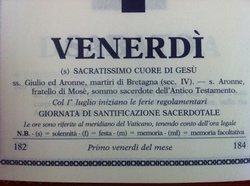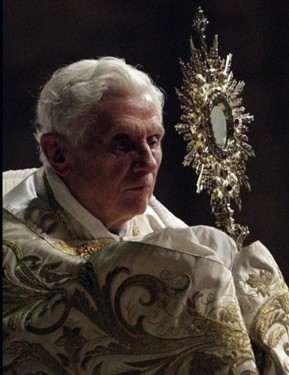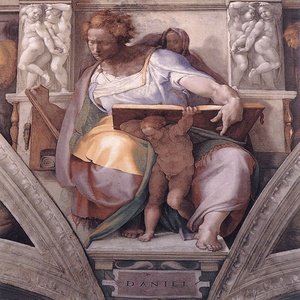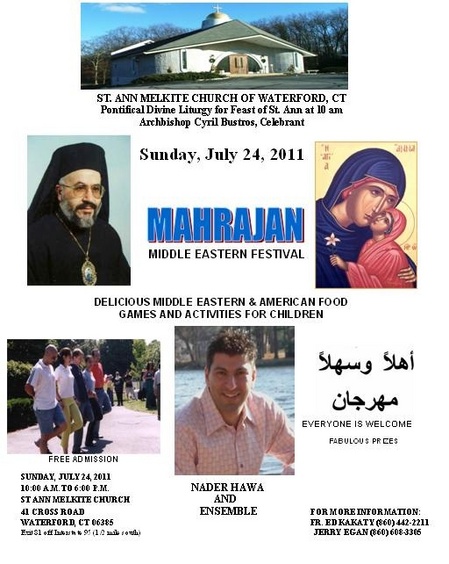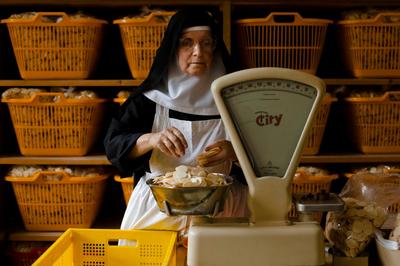 In this photo taken July 28, 2011 Sister Placida scales hosts at the Benedictine Abbey of St. Gertrud's host bakery in Alexanderdorf, Germany, about 50 kilometers (31 miles) south of Berlin. Pope Benedict XVI will not visit the Benedictine Abbey of St. Gertrud, but preparations for his trip are nevertheless in full swing, with the nuns baking thousands of communion wafers to be blessed by the pope at Masses during his September tour. (Photo/Markus Schreiber)
In this photo taken July 28, 2011 Sister Placida scales hosts at the Benedictine Abbey of St. Gertrud's host bakery in Alexanderdorf, Germany, about 50 kilometers (31 miles) south of Berlin. Pope Benedict XVI will not visit the Benedictine Abbey of St. Gertrud, but preparations for his trip are nevertheless in full swing, with the nuns baking thousands of communion wafers to be blessed by the pope at Masses during his September tour. (Photo/Markus Schreiber)
Paul Zalonski: July 2011 Archives
 In this photo taken July 28, 2011 Sister Placida scales hosts at the Benedictine Abbey of St. Gertrud's host bakery in Alexanderdorf, Germany, about 50 kilometers (31 miles) south of Berlin. Pope Benedict XVI will not visit the Benedictine Abbey of St. Gertrud, but preparations for his trip are nevertheless in full swing, with the nuns baking thousands of communion wafers to be blessed by the pope at Masses during his September tour. (Photo/Markus Schreiber)
In this photo taken July 28, 2011 Sister Placida scales hosts at the Benedictine Abbey of St. Gertrud's host bakery in Alexanderdorf, Germany, about 50 kilometers (31 miles) south of Berlin. Pope Benedict XVI will not visit the Benedictine Abbey of St. Gertrud, but preparations for his trip are nevertheless in full swing, with the nuns baking thousands of communion wafers to be blessed by the pope at Masses during his September tour. (Photo/Markus Schreiber)
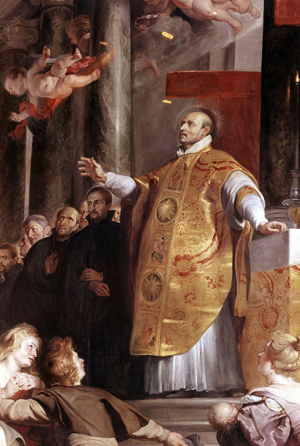 Today's second reading for the 18th Sunday through the Year coheres with Saint Ignatius of Loyola's liturgical memorial we would have celebrated had it not been a Sunday. Saint Paul sets our sights on the fact that nothing can be a barrier to Christ's Love for us. But do we believe this? Do we live on the edge of Love or in Love's center? Listen again to the famous passage from the Apostle to the Gentiles and think of the spirituality of Loyola:
Today's second reading for the 18th Sunday through the Year coheres with Saint Ignatius of Loyola's liturgical memorial we would have celebrated had it not been a Sunday. Saint Paul sets our sights on the fact that nothing can be a barrier to Christ's Love for us. But do we believe this? Do we live on the edge of Love or in Love's center? Listen again to the famous passage from the Apostle to the Gentiles and think of the spirituality of Loyola: Who shall separate us from the love of Christ? Shall tribulation or distress or persecution, or famine or nakedness or peril or sword? No, in these things we are more than conquerors through Him that loved us. I am persuaded that neither death nor life, nor angels, nor height, nor depth, nor any other creature shall be able to separate us from the love of God, which is in Christ Jesus our Lord. (Romans 8:30-39)
Going along in my uncertainties I muddle over questions of life that affect me on the spiritual level. Perhaps others do the same. One of the things that Father Carrón is asking in his 2011 retreat for the Fraternity of Communion and Liberation is: do we recognize that despite our human weakness, or failings, that Christ still loves every part of me? Yes, but not always. Sometimes it is difficult to be aware such an expression of the Other. Why this is so, I am still trying to figure out. Let me know when you get the answer. The Abbot of Christ in the Desert in New Mexico writes a weekly online column which is often insightful. The following is a portion of that column that used for reflection:
Some people are insistent at times, to me, that it is impossible any longer to lead a truly chaste and celibate life. My general reply is that it has always been more or less impossible and is only truly possible when there is a strong faith and a deep commitment to the Lord and a trust that God will give us the strength that we need. Without a doubt that have always been failures and there will always be failures, but that is to be taken for granted in the human condition. Repentance and conversion are a part of any Christian life and are always values and realities that struggle against the brokenness that we find within us.
There is no doubt that all of us are created good and that God always loves us. Our own understanding of ourselves, though, helps us understand that our goodness has been compromised by others, by ourselves and by situations outside of our control. The gifts of repentance and conversion help us in our struggle against all within us that has been compromised.
This gift of the capacity to struggle against our brokenness is one of the gifts of salvation given to us in Christ Jesus. Jesus is a model for us in His humanity because He lived for truth and for the glory of His Father. Jesus won and wins salvation for us by giving Himself up to death and by rising from the dead.
Father Philip,Abbot of Christ in the Desert Monastery
The group of bishops and experts who oversee the translation and promulgation of liturgical texts in English met in Rome this past week. Read the CNS story on the meeting by Cindy Wooden. Here is the press release.
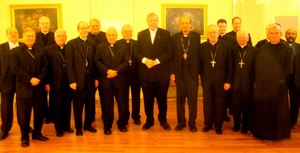
The Vox Clara Committee met from July 24-26 in Rome. This Committee of senior Bishops from Episcopal Conferences throughout the English-speaking world was formed by the Congregation for Divine Worship and the Discipline of the Sacraments on July 19, 2001 in order to provide advice to the Holy See concerning English-language liturgical books and to strengthen effective cooperation with the Conferences of Bishops in this regard.
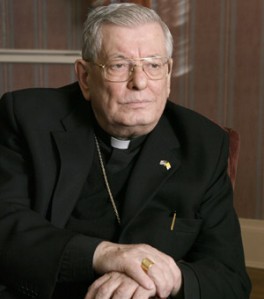
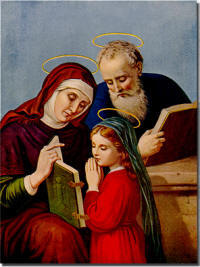
O Lord, God of
our Fathers, who bestowed on Saints Joachim and Anne this grace, that of them should
be born the Mother of your incarnate Son, grant, through the prayers of both,
that we may attain the salvation you have promised to your people.
Today's the liturgical memorial of Saints Ann and Joachim, the parents of Mary, the Mother of God and the grandparents of Jesus. In the simplest understanding is that the Church remembers the Lord's family members. But let's move beyond this initial thought and look more closely at the collect noted above: the priest prays that through the intercession of Ann and Joachim salvation may be given to us as promised to God's people.
Historically we know that Ann and Joachim existed; their biographies are unknown to us. What we do learn from sacred Tradition is the approach Ann and Joachim took to the action of the Divine Majesty in their lives. They trusted in God.
The Church brings to our awareness the lines of grace in a historical fashion. The prayer reminds us of Jesus' humanity and the promise God the Father made to His people: His Presence among us; an offer for salvation. This feast is clearly interpreted for us in the first reading from Sirach and the psalm. There we hear the beautiful words of promise, of remembrance, of relationship.
 Benedictine abbeys are places where the culture of prayer, study, charitable work and arts and crafts can breathe with ease. That's the genius of Saint Benedict and the leadership of monasticism through 1500 years. Few religious orders have such an expansive sense of culture as the Benedictines (or share in across the world). Art aids one in his or seeking God and a better sense of self.
Benedictine abbeys are places where the culture of prayer, study, charitable work and arts and crafts can breathe with ease. That's the genius of Saint Benedict and the leadership of monasticism through 1500 years. Few religious orders have such an expansive sense of culture as the Benedictines (or share in across the world). Art aids one in his or seeking God and a better sense of self.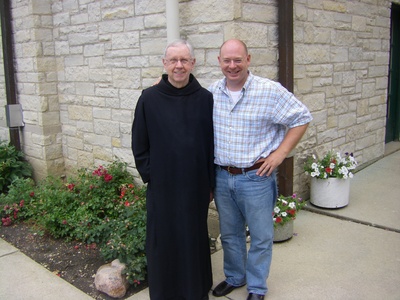
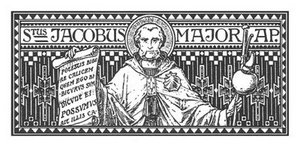 Saint James, the son of Zebedee, and brother of Saint
John the Apostle, was a Galilean. He was one of the first to be called to the
Apostolate, together with his brother, and, leaving his father and his nets, he
followed the Lord. Jesus called them both Boanerges, that is to say, sons of
thunder. He was one of the three Apostles whom our Savior loved the most, and
whom He chose as witnesses of His Transfiguration, and of the miracle by which
He raised to life the daughter of the ruler of the synagogue, and whom he
wished to be present when He retired to the Mount of Olives to pray to His
Father, before being taken captive by the Jews.
Saint James, the son of Zebedee, and brother of Saint
John the Apostle, was a Galilean. He was one of the first to be called to the
Apostolate, together with his brother, and, leaving his father and his nets, he
followed the Lord. Jesus called them both Boanerges, that is to say, sons of
thunder. He was one of the three Apostles whom our Savior loved the most, and
whom He chose as witnesses of His Transfiguration, and of the miracle by which
He raised to life the daughter of the ruler of the synagogue, and whom he
wished to be present when He retired to the Mount of Olives to pray to His
Father, before being taken captive by the Jews.
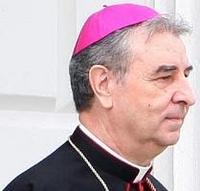 In an extraordinary act, the Holy See has recalled the papal nuncio, Archbishop Giuseppe Leanza, 68, to Rome to understand the implications of the July 13, 2011 Cloyne Report (421 pages worth) that indicated yet more of the clerical sex abuse.
In an extraordinary act, the Holy See has recalled the papal nuncio, Archbishop Giuseppe Leanza, 68, to Rome to understand the implications of the July 13, 2011 Cloyne Report (421 pages worth) that indicated yet more of the clerical sex abuse.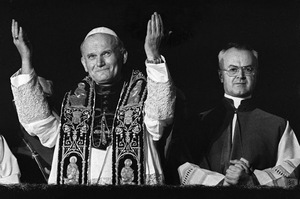 One the well-known faces in the Vatican curia died earlier today. Virgilio Cardinal Noè, 89, died in Rome.
One the well-known faces in the Vatican curia died earlier today. Virgilio Cardinal Noè, 89, died in Rome.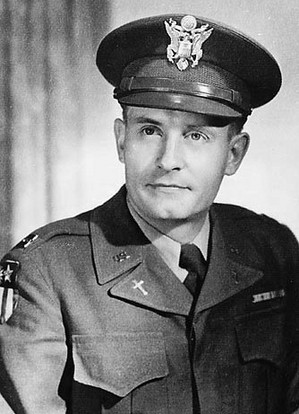
The Church in the US could have another saint if US Army chaplain Father Emil Kapaun's cause for beatification is accepted by the Congregation for the Causes of Saints.
The work of getting the relevant materials ready has been under the able hands of Father John Hotze, the bishop's delegate for the study of Father Kapaun's beatification and canonization. A priest of the Diocese of Wichta since 1940, Father Kapaun served in the US Army from 1944 until his death in 1951. In fact, he died in a prison camp hospital on May 23, 1951 (he was born on April 20, 1916). The Diocese of Wichita has the competence to present the dossier of his life when it officially opened the cause for his beatification on June 29, 2008.
Father Emil Kapaun, a native of Pilsen, Kansas, served in the Korean War as a US Army chaplain, and was known for his selflessness. Kapaun is on record for courageously rescuing wounded soldiers from the battlefield, risking his own life to prevent their execution at the hands of the Chinese. The care of the priest saved the lives of sick and injured soldiers.
The well-known Dr. Andrea Ambrosi, is going to shepherd the Kapaun case. He'll be the person who will present Kapaun's case, all 8,268 documents about the chaplain's deeds and sacrifices in the Korean War, to the Congregation of Saints at the Vatican said based on what he knows thus far, Father Kapaun has a good chance at being beatified. Ambrosi said: "He showed that there was not just a devil working on the battlefields of the war, but something else." The face of Christ.
Two miracles are being studied.
- In 2006, Avery Gerleman, then 12 years-old, near death for 87 days. She recovered after her parents prayed to Kapaun.
- In October 2008, Chase Kear, a college track athlete, medically inexplicable, he survived a severe pole vaulting accident. His skull was fractured in several crucial places and caused bleeding on his brain. The prognosis was very grim. Family prayed for Father Emil's intercession.
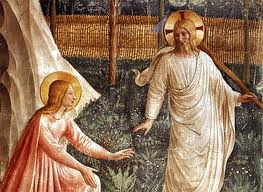
"Everywhere in our culture, people seem so quick to condemn. It is very hard to find words of mercy or understanding for someone who has done something wrong, many good people out there saying things they know they shouldn't be saying.
People make mistakes. They sin. Some people do evil that causes scandal and grave harm. We can condemn the offense and work for justice -- without trying to destroy the person who committed the sin.
We need to reject every temptation to shame or condemn people. Let us never be the cause of turning someone away from seeking God's forgiveness and redemption.
Let us pray for one another this week, ask the Virgin Mary to 'give us a faith like Mary Magdalene and hearts to forgive.'"
José H. Gomez, Archbishop of Los Angeles
The Tidings, July 22, 2011
 In his Sunday prayers Pope Benedict appealed on behalf of the victims of the severe drought in the Horn of Africa, particularly Somalia. He asked Christians to show solidarity for the millions that face death by starvation in the worst conditions there in a century. Rain is not expected until October.
In his Sunday prayers Pope Benedict appealed on behalf of the victims of the severe drought in the Horn of Africa, particularly Somalia. He asked Christians to show solidarity for the millions that face death by starvation in the worst conditions there in a century. Rain is not expected until October.Much has been said about Anthony Cekada's book Work of Human Hands, some of the critique is lazy, or rigidly steadfast to one's limp opinion. Nothing is so relevant as information, and nothing so problematic as ignorance (being "untrained"). My hope is that we'd not be too preoccupied by our our thinking; I have confidence that Truth can be revealed in honest thinking and dialogue. The sacred Liturgy, because of its import in our worship of the Triune God, needs to be faithful to Christ and to the Tradition the Church. Cekada's work is a sizable and it deserves attention. Because of my interest in the sacred Liturgy I am re-posting the book review originally posted on the New Liturgical Movement blog. I am grateful to Dr Alcuin Reid for his tour of the work and the author, and to Shawn Tribe for posting Reid's review.
Anthony Cekada, Work of Human Hands: A Theological Critique of the Mass of Paul VI, Philothea Press, West Chester, Ohio 2010.
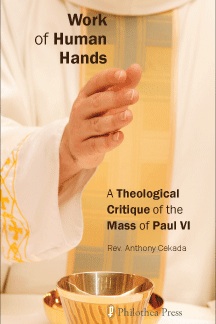
I have long been in Father Cekada's debt, for it was his booklet The Problems with the Prayers of the Modern Mass that alerted me almost twenty years ago to the significant theological difference between the pre-conciliar and post-conciliar Roman Missals. Work of Human Hands is by no means so succinct a publication. It is a substantial attempt to demonstrate profound theological rupture between the two, and more. It deserves serious attention.
Some will dismiss this study because Father Cekada is canonically irregular and a sede vacantist. Whilst these are more than regrettable, ad hominem realities are not sufficient to dismiss this carefully argued and well researched work. We must attend to his arguments on their merits.
The principal thesis is that "the Mass of Paul VI destroys Catholic doctrine in the minds of the faithful and in particular, Catholic doctrine concerning the Holy Sacrifice of the Mass, the priesthood and the real presence," and that it "permits or prescribes grave irreverence." His secondary thesis is that the Mass of Paul VI is invalid. His practical conclusion is that "a Catholic may not merely prefer the old rite to the new; he must also reject the new rite in its entirety. The faith obliges him to do so." These strong, even extreme, positions may themselves repel readers. But again, they must be examined.
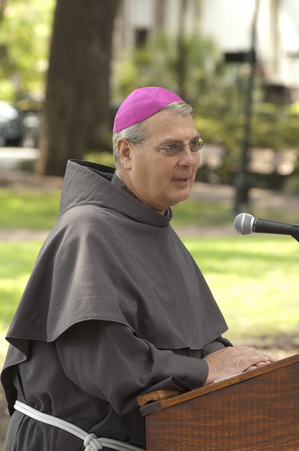
This past Saturday was the feast of Our Lady of Mount Carmel, the liturgical commemoration of Mary on which we automatically thought of the brown scapular. Or, we did make an association with the BVM of Mount Carmel and the scapular. Our sensibilities have changed dramatically to the point that only the old people remember such devotions by-and-large.
Recently at the parish we were talking about selling rosaries, bibles, catechisms nun-made fudge, and I introduced offering the brown scapular. The person who is organizing this very small "church store" looked at me quizzically: what are scapulars? So much for Catholic culture and the Catholic liturgical imagination! I explained that as a concept originally referred to a form of clothing, a wide band of clothe put on the shoulders reaching down to the front and back of the legs, often to the ankles. The scapular is worn by priests, nuns, and sisters like, but not limited to the Dominicans; the scapular historically was worn as an apron that would protect the tunic. Later the scapular was blessed taking it out of the realm of a work outfit. But I am not talking about the scapular worn as part of the religious habit of the religious.
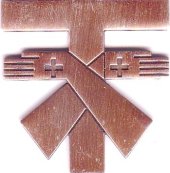 With today's appointment of the Archbishop of Philadelphia and Bishop of Savannah, the number of Franciscans serving the Church in the USA as residential bishops went up. Surprisingly we now have two Conventual Franciscans bishops. Currently, Franciscan bishops the dioceses of Boston, Philadelphia, La Crosse and Savannah. Two Capuchins and two Conventuals. If you count Puerto Rico, then there's the Archbishop of San Juan who is a "normal brown" Franciscan.
With today's appointment of the Archbishop of Philadelphia and Bishop of Savannah, the number of Franciscans serving the Church in the USA as residential bishops went up. Surprisingly we now have two Conventual Franciscans bishops. Currently, Franciscan bishops the dioceses of Boston, Philadelphia, La Crosse and Savannah. Two Capuchins and two Conventuals. If you count Puerto Rico, then there's the Archbishop of San Juan who is a "normal brown" Franciscan.It is official...
Il Santo Padre Benedetto XVI ha accettato la rinuncia al governo pastorale dell'arcidiocesi metropolitana di Philadelphia (U.S.A.), presentata dall'Em.mo Card. Justin F. Rigali, in conformità al can. 401 § 1 del Codice di Diritto Canonico.
Il Papa ha nominato Arcivescovo Metropolita di Philadelphia (U.S.A.) S.E. Mons. Charles J. Chaput, O.F.M. Cap., finora Arcivescovo di Denver.
The Archdiocese has a page for Archbishop Chaput.
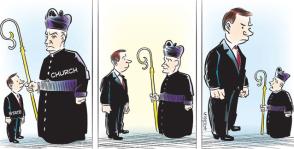 There are various reasons why the influence of the Church has waned in recent years. And it can't all be blamed on the sexual abuse of minors, though this issue has significantly contributed greatly to the diminishment. Her street cred is, at this time, based not on witness or the coherence of the Christian proposal or charitable works.
There are various reasons why the influence of the Church has waned in recent years. And it can't all be blamed on the sexual abuse of minors, though this issue has significantly contributed greatly to the diminishment. Her street cred is, at this time, based not on witness or the coherence of the Christian proposal or charitable works.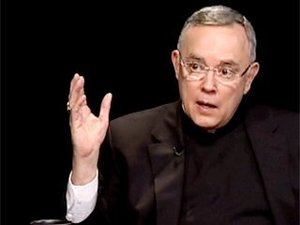
It is expected that Pope Benedict XVI will nominate Archbishop Charles Joseph Chaput,
OFM Cap., 66, of Denver, a Native American Indian (Prairie Band Potawatomi
Tribe), as the 13th Bishop and 9th Archbishop of Philadelphia. He replaces His
Eminence, Justin Francis Cardinal Rigali, 76, who has served the Archdiocese
since 2003. The Cardinal has been a priest for 50 years, a bishop for 26 years
and a cardinal for nearly 8 years.
Charles Joseph Chaput was born in Concordia, Kansas. He entered the Saint Augustine Province of the Capuchin Franciscans in 1965, professing vows at 21 in 1967.
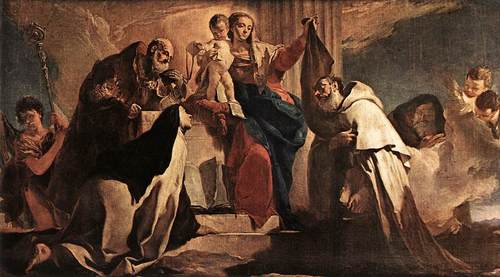
On my mind and in my heart I have been thinking a priest who died on 3 July at his own hand. Father Paul Archambault, 42, priest of the Diocese of Springfield, MA, had his demons with which to struggle in this life; his struggle is not unlike the rest of humanity, that is, a struggle to live with great humanity tensions between grace and sin. I didn't know Father Paul; I am nonetheless moved by his hasty act and struck by his death at this young age, one that I share with him. Father Paul's desperate act of suicide is bewildering and saddening. My reflections lead me to say that sometimes we are consumed by sin (or some other weakness) and forget that there is Friendship beyond all others really cares for us. Nevertheless, Christ is present to sustain us when we can't remember that He's offered us the Hundredfold.
Father John Lessard, former pastor of Our Lady of Guadalupe Parish in Holyoke and friend of Father Paul, delivered the words noted below at the funeral at Saint Elizabeth Ann Seton Parish in Northampton on July 12.
What is our response to this tragic end of a priest? First, I would suggest that we beg the Holy Spirit to preserve us from nihilistic temptations. Suicide is a mis-understood act that many are tempted, even priests. In a week's time I know of one other priest who attempted suicide and lived. And over the years, I have known four priests to have committed suicide. Second, cast an eye of mercy on those who struggle with the temptation to permanently end their pain and suffering. What are the distinguishing characteristics of Christ's presence in these events? Third, pray for priests. Fourth, be a good friend to others, particularly priests.
Let us help each other see the Face of Christ. Let us also pray for each other, and at this time all those who mourn Father Paul Archambault. Also, I would also caution against defining a person exclusively by some of his or her actions. We are more than one or two actions.
Here are a few paragraphs. For the rest of Father Lessard's address, you may read it here.
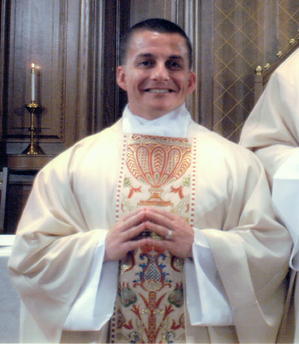
So, it is with the Sacrament of Holy Orders of the Priesthood. Grace. Not magic. And a man who enters into this unique and tremendous Sacrament, much like married people, does not become immune to anything but rather can count on his troubles to increase as the evil enemy fights with all his might to take down a priest. The Sacrament of Holy Orders does not prevent sickness or illness of any kind, does not cure what was already there. And we must understand that true sickness, whether it be of body or of mind is sickness; it is not chosen. A couple of years ago, a dear friend was diagnosed with breast cancer. Would it possibly ever cross one's mind to blame her for her cancer? Of course not. If we are to love one another, care for and about one another as Christ not only asked us to do but commanded us to do and tells us our salvation rests largely upon fulfilling that command, we must put aside any and all silliness and ignorance that prevent us from seeing illness for what it is, no matter what that illness is. Would we blame a man with Parkinson's disease for his chronic illness? Of course not. Do you blame the child who develops leukemia? The thought is absurd and ludicrous, isn't it? And as with cancer or any other malady of the body, so with illness of the mind sometimes treatments cure, sometimes they are very successful for a number of years, sometimes they are partly and briefly successful, sometimes they fail outright.
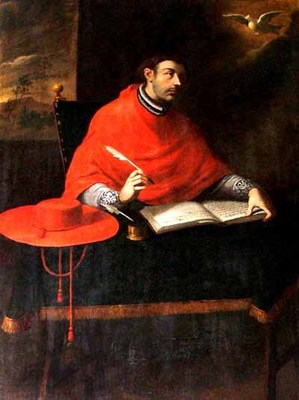
Grant, we pray, almighty God, that, just as we celebrate the heavenly birthday of the Bishop Saint Bonaventure, we may benefit from his great learning and constantly imitate the ardor of his charity.
Pope Benedict gave these 3 addresses on March 3, March 10, and March 17. Read these Wednesday audience addresses if you are serious about Saint Bonaventure!
My friend Father Charles at A Minor Friar has a brief thought on this great Franciscan friar, doctor, bishop of the Church.
The head of the Communion and Liberation Movement, Father Julián Carrón wrote an editorial for tomorrow's (July 14, 2011) edition of the L'Osservatore Romano about the forthcoming Day of Prayer in Assisi on October 27, recognizing the theme of peace and justice.
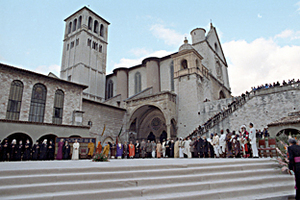
The Day for Reflection, Dialogue and Prayer for Peace and Justice in the World, convoked in Assisi next October 27 by Benedict XVI is an audacious gesture, just as Blessed John Paul II's initiative was, 25 years ago.
"In the name of what can (Pope Wojtyla) call exponents of all religions together to pray in Assisi?" asked Don Luigi Giussani twenty-five years ago. He answered, "If one understands the nature of man, the heart of man, it is his religious sense, it is in the religious sense that all men find equality and identity. The most profound meaning in the human heart is religious sentiment, destiny on the one hand and the usefulness of the present on the other. If we want to use the right terms, a sense of religion is the only sense which is truly catholic, which means suitable for everyone and belonging to everyone."
Rino Fisichella, the archbishop who head's the Pope's evangelization office has rolled out his newest, that is, the first, endeavor since the founding of the office in the July 12 L'Osservatore Romano. They're calling it the "Metropolitan
mission" The goal is simple:
To avoid the risk of the new evangelization becoming just another formula adapted for every season, it is important that it be filled with content which informs the pastoral action of the different Christian communities. In this sense, everyday pastoral work, which has always animated the life of the Church, must renew its ways of presenting itself and implementing its activities.
Benedict XVI, speaking to the first plenary assembly of the Pontifical Council for Promoting the New Evangelization, said that it was of decisive importance to go beyond the fragmentation of society and offer concrete answers to the great challenges of today. To fill this need, a "metropolitan mission" has been put into action. The goal is simple: to give a sign of unity among the diverse dioceses present in the largest European cities that have been particularly affected by secularization.
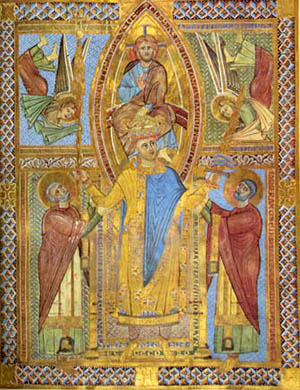 The Church recalls the witness of an emperor and a Benedictine Oblate, Saint Henry (972-1024), Duke of Bavaria. Henry was crowned king in Rome by Pope Benedict VIII in 1014. It is said that Henry was assisted by the saints throughout his life but especially at Mass when he was anointed king. He was an insightful leader, lay man who had concern for the discipline of the Church and who had love for the Benedictine monastic life. He was a supporter of Cluny's reforms. It was through Saint Henry that the King of Hungary and later saint, Stephen, met Christ and was baptized.
The Church recalls the witness of an emperor and a Benedictine Oblate, Saint Henry (972-1024), Duke of Bavaria. Henry was crowned king in Rome by Pope Benedict VIII in 1014. It is said that Henry was assisted by the saints throughout his life but especially at Mass when he was anointed king. He was an insightful leader, lay man who had concern for the discipline of the Church and who had love for the Benedictine monastic life. He was a supporter of Cluny's reforms. It was through Saint Henry that the King of Hungary and later saint, Stephen, met Christ and was baptized.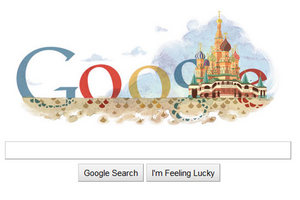
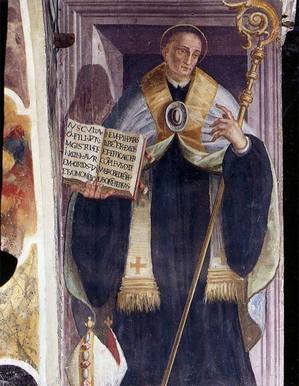 "St. Benedict's is best understood as the spirituality
of ordinary life... The Benedictine is a spirituality of work: man's by labor,
God's by prayer." (John Senior)
"St. Benedict's is best understood as the spirituality
of ordinary life... The Benedictine is a spirituality of work: man's by labor,
God's by prayer." (John Senior)
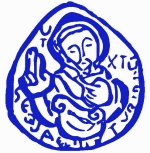 Today is the 31st anniversary of the foundation of Fraternity of Communion and Liberation. The narrative of the Fraternity's founding is told in "The Greatest Grace in the History of the Movement" by Giorgio Feliciani (Traces, February 2007). Here's the story.
Today is the 31st anniversary of the foundation of Fraternity of Communion and Liberation. The narrative of the Fraternity's founding is told in "The Greatest Grace in the History of the Movement" by Giorgio Feliciani (Traces, February 2007). Here's the story.
A priest in the direct service of the Holy See, Monsignor Mariano De Nicolò, currently Bishop of Rimini [he retired 3 July 2007], happened to review, as part of his official duties, a file that illustrated and documented the Movement's desiderata. Feeling that these aspirations deserved attention and further study, he suggested to Father Francesco Ricci, who at the time was sharing responsibility for the Movement with Father Giussani [for more about this priest, who died in 1991, see Francesco Ricci. Una passione, cento passioni, San Martino in Strada, Lit. Citienne, 1996], that he consult with Monsignor Giuseppe Lobina, an expert in Canon Law who, along with a solid formal training, had an unusual amount of experience with ecclesiastical praxis.
This advice was promptly taken and, only a few months later, Monsignor Lobina, after acquiring all the necessary information in various meetings with CL figures and Father Giussani himself, was drawing up what would soon be the Statute of the Fraternity, which has remained largely unchanged up to now.
Monsignor Lobina also undertook to find the ecclesiastical authority willing to approve the Movement, and found him in Abbot Martino Matronola, who, as provost [abbot] of the monastery of Montecassino, had the same powers over the surrounding territory as the bishop of a diocese. This acceptance was even more welcome because Father Giussani felt that the concept of his Movement was very close to that of the Benedictines (see Giussani, op.cit., pp. 74-75).
The formal establishment of the Fraternity came shortly thereafter in a very discreet, unassuming way. On July 11, 1980-the solemnity of Saint Benedict, Patron of Europe, on the fifteenth centenary of his birth-a small group of twelve stood together with Father Giussani in front of the Abbot to be constituted as a canonical association. On that same day, Monsignor Matronola,* by a specific formal decree, granted juridical status in the Church to the ecclesial movement called "Fraternity of Communion and Liberation" and approved its statutes and "works of apostolate and individual and social formation," placing it under the "protection of the Immaculate Virgin and our Patron Saint Benedict" (see the Bollettino Diocesano di Montecassino, no. 3, 1980, pp. 223-224).
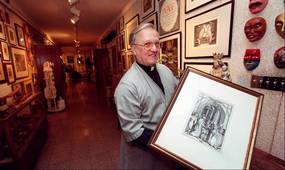 Benedictine culture is very interesting. I find this to be true for 2 reasons: after 1500 years of Benedictine monasticism a refined style of humanity and relationship with God is constitutive and monasteries have interesting people as monks and nuns. The famous Rule of Saint Benedict encourages the monk to praise and worship God through a proper ordering of life and interest. Few Benedictines I know are not proficient in works of culture (in the true meaning of the word) like music, vestment making, bee keeping, keeping the library, preparing good lessons for the classroom, cooking, music writing, preaching, study and the like.
Benedictine culture is very interesting. I find this to be true for 2 reasons: after 1500 years of Benedictine monasticism a refined style of humanity and relationship with God is constitutive and monasteries have interesting people as monks and nuns. The famous Rule of Saint Benedict encourages the monk to praise and worship God through a proper ordering of life and interest. Few Benedictines I know are not proficient in works of culture (in the true meaning of the word) like music, vestment making, bee keeping, keeping the library, preparing good lessons for the classroom, cooking, music writing, preaching, study and the like.
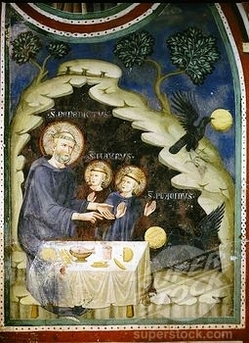
One of my favorite parts of the Saint Benedict's hagiography (iconography) is the narrative of the "man of God" (Benedict) and the raven. It is related by Saint Gregory the Great (+603) that in the wilderness Benedict fed a raven with some a portion of his bread. When a jealous and wicked priest tried to kill Benedict with poisoned bread, Benedict coached the raven to take the deadly bread to place where it couldn't harm another. The raven complied.
In his Dialogues Gregory writes, "Then the raven, opening its beak wide and spreading its wings, began to run around the bread, cawing, as if to indicate that it wanted to obey but was unable to carry out the order. Again and again the man of God told him to do it, saying, 'Pick it up, pick it up. Do not be afraid. Just drop it where it cannot be found.' After hesitating a long time, the raven took the bread in its beak, picked it up and flew away. Three hours later it came back, after having thrown the bread away, and received its usual ration from the hands of the man of God."
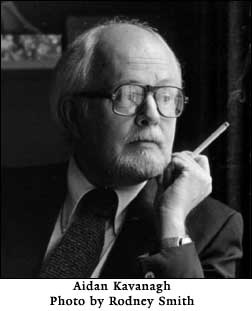 Students of the sacred Liturgy are familiar with the scholarship
and some would say "pioneering work" in the realm of adult baptism and the new (in 1972) Rite of Christian Initiation of Adults (RCIA) by Father Aidan Kavanagh, a Benedictine monk
and priest of the Archabbey of Saint Meinrad.
Students of the sacred Liturgy are familiar with the scholarship
and some would say "pioneering work" in the realm of adult baptism and the new (in 1972) Rite of Christian Initiation of Adults (RCIA) by Father Aidan Kavanagh, a Benedictine monk
and priest of the Archabbey of Saint Meinrad.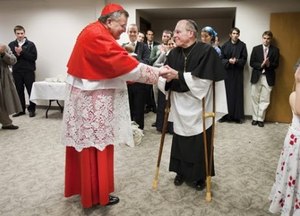 Today, the monks of Saint Louis Abbey elected for the third time, Abbot Thomas Frerking.
Today, the monks of Saint Louis Abbey elected for the third time, Abbot Thomas Frerking. The past few weeks have proved to be a most confusing time trying to figure out the assertions made against the "former Father John Corapi" now taking a leave from ministry. Today, a "Press Release Concerning Fr John Corapi from SOLT Regional Priest Servant" was released. It is a disturbing piece of information but something that deserves our time, patience and prayer. Someone accused me of misjudging Corapi when the allegations surfaced; my only response is that it is possible that a former addict could have a relapse. We need to exhibit Christian forgiveness and beg God for His Mercy. We need to beg the Holy Spirit to warm John Corapi's heart to return to the regular observance of his vowed religious life. Here's the text:
From: Rev. Gerard Sheehan, SOLT Regional Priest Servant Society of Our Lady of the Most Holy Trinity Robstown, Texas
Fr. John A. Corapi submitted his resignation from the Society of Our Lady of the Most Holy Trinity ("SOLT") early in June. SOLT is a Society of Apostolic Life of Diocesan Right with its regional office in Robstown, Texas.
While SOLT does not typically comment publicly on personnel matters, it recognizes that Fr. John Corapi, through his ministry, has inspired thousands of faithful Catholics, many of whom continue to express their support of him. SOLT also recognizes that Fr. Corapi is now misleading these individuals through his false statements and characterizations. It is for these Catholics that SOLT, by means of this announcement, seeks to set the record straight.
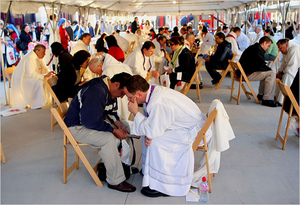
The Congregation for Clergy published an examination of conscience entitled "The Priest, Minister of Divine Mercy: An Aid for Confessors and Spiritual Directors" which hopes to reinvigorate the priest's spiritual paternity by a recovery of the sacrament of Confession by penitent and confessor. Here is yet another aspect of the new evangelization called for by Blessed John Paul II and now Pope Benedict: the renewal of priests and people through Reconciliation. This document is the fruit of Pope Benedict's Year for Priests. As Cardinal Piacenza notes, this "is a measure of authentic faith in the saving action of God which shows itself more clearly in the power of grace than in human strategic or pastoral initiatives which sometimes overlook this essential truth." A sobering statement for one who works in a parish.
On the surface it seems that this text is exclusively for the clergy. Don't be fooled! I would recommend it to the laity as well. Be acquainted to the sacrament of Confession, the theology and practice of the Church and what the Church expects of her clergy. We have to help each other see Christ's work among through concrete manifestation of Divine Mercy.
The introduction follows here (the link to the full text is at the end):
"It is necessary to return to the confessional as a place in which to celebrate the Sacrament of Reconciliation, but also as a place in which "to dwell" more often, so that the faithful may and compassion, advice and comfort, feel that they are loved and understood by God and experience the presence of Divine Mercy beside the Real Presence in the Eucharist".
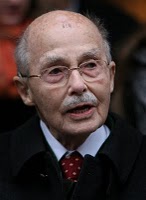 Archduke Franz Joseph Otto Robert Maria Anton Karl Max Heinrich Sixtus Xavier Felix Renatus Ludwig Gaetan Pius Ignatius von Hapsburg, 98, died July 4, in his sleep at his home. His Imperial Highness was the eldest son of the last Austian-Hungarian emperor, Charles I. The Empire, ruled by the Habsburg family since the 13th century disintegrated following World War I.
Archduke Franz Joseph Otto Robert Maria Anton Karl Max Heinrich Sixtus Xavier Felix Renatus Ludwig Gaetan Pius Ignatius von Hapsburg, 98, died July 4, in his sleep at his home. His Imperial Highness was the eldest son of the last Austian-Hungarian emperor, Charles I. The Empire, ruled by the Habsburg family since the 13th century disintegrated following World War I.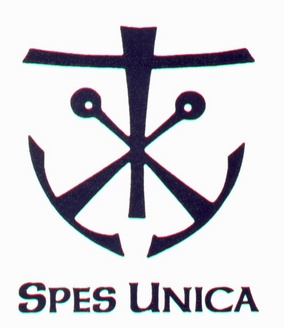 Today marks the beginning of new life within the Congregation of Holy Cross in the USA: the merging of the Eastern and Indiana Provinces. The coming together on this date in 2011 is noteworthy because today is the solemnity of the Sacred Heart of Jesus, a feast near and dear to the Congregation. The merger follows upon the decision taken by the 2010 General Chapter. The new province now has more than 100 seminarians numbers more than 500 priests and brothers. Around the world there are about 1500 CSCs.
Today marks the beginning of new life within the Congregation of Holy Cross in the USA: the merging of the Eastern and Indiana Provinces. The coming together on this date in 2011 is noteworthy because today is the solemnity of the Sacred Heart of Jesus, a feast near and dear to the Congregation. The merger follows upon the decision taken by the 2010 General Chapter. The new province now has more than 100 seminarians numbers more than 500 priests and brothers. Around the world there are about 1500 CSCs.